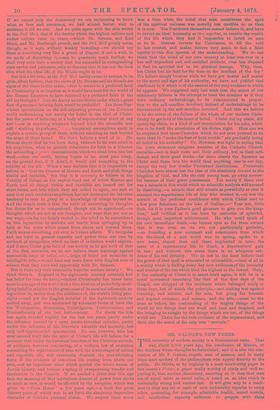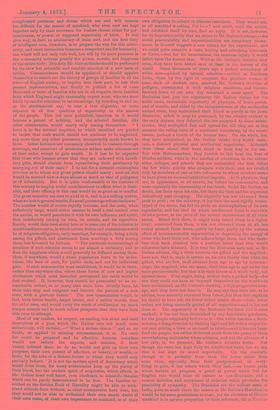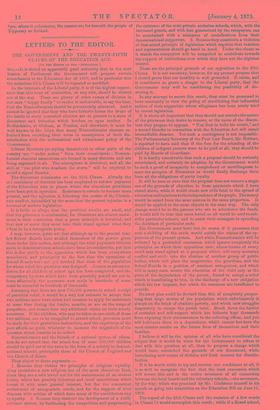MR. GALTON'S NEW PEERS.
THE necessity of modern society is a Brahminioal caste. That was, about 3,000 years ago, the conclusion of Munoo, or the thinkers whose thoughts he formulated ; and it is also the con- clusion of Mr. F. Galton, sceptic, man of science, and in many ways most modern of the philosophers who appeal directly to the public. He thinks, as he explains in a moat noteworthy paper in this month's Fraser, a paper really worthy of study and well re- paying it, that modern democracy, asserting as it does that men are of equal value as social units, is based on an idea which is undeniably wrong and cannot last. it will give way to a readi- ness to obey any set or caste of men undeniably superior to every other, possessing, for example, admirable health, sound morale, and intellectual capacity sufficient to grapple with those complicated problems and duties which are and will remain too difficult for the masses of mankind, who even now are kept together only by their reverence for leaders chosen either for per- suasivenees, or power, or supposed superiority of birth. It will give way, in fact, to aristocracy of some sort, and the first duty of intelligent men, therefore, is to prepare the way for this aristo- cracy, and exert themselves to secure a competent one for humanity, one which will not only rule well, but will by its mere presence in the community increase greatly the power, morale, and happiness of the-entire body. This duty Mr. Galton thinks should be performed by thealow but scientific and resolute selection of a new caste of nobles. Commissioners should be appointed or should appoint themselves to search out the history of groups of families in all the strata of English society, to inquire into their past, to teat their present representatives, and finally to publish a list of some thousand or more of families who are in all respects those families from which England might reasonably expect most, who are most likely by careful attention to intermarriage, by breeding in and in, as the stockmastera say, to rear a true oligarchy, or caste superior in all true qualities of superiority to the masses of the people. This list once published, insertion in it would become a patent of nobility, and the selected families, like other aristocracies, would marry only among themselves.- "I leave it to the natural impulses by which mankind are guided to insure that such wealth should not continue to be neglected, any more than any other possession unexpectedly made known to them. Great fortunes are commonly observed to coalesce through marriage, and members of aristocracies seldom make alliances out of their order, except to gain wealth. Is it less to be expected that those who become aware that they are endowed with heredi- tary gifts, should abstain from squandering their patrimony by marrying out of their caste ? I do not for a moment contemplate coercion as to whom any given person should marry ; such an idea would be scouted now-a-days almost as much as that of polygamy or of infanticide. But it is quite conformable to the customs of this century to employ social considerations to effect what is desir- able, and their efficacy in this case would be as great as is needful. The great majority are sure to yield to it, and it is a trifling matter, when we look to general results, if a smallpercentage ref useobedience." The number would of course rapidly increase, and the caste, when sufficiently large, would either assume to itself a real control over the nation, or would penetrate it with its own inthrence and spirit, thus indefinitely raising its tone, its morale, and its capacities. Society would then tend either here or in some one of the colonies to mould itself into castes, in which certain duties and abstentions would be of religious obligation, early marriage, for example, being a duty among the gifted, and abstinence from marriage a duty among those less favoured by fortune. "The continual intermarriage of members of such colonies seems to me almost a certainty, and so does the happiness which would generally be diffused among them. Here, if anywhere, would a whole population learn to be indus- trious, like bees or ants, for public ends, and not for individual gain. If such communities were established, it would be in them, rather than anywhere else, where those forms of new and higher civilisation which must hereafter overspread the earth would be first evolved. If, however, they should be persecuted to an un- reasonable extent, as so many able sects have already been, let them take ship and emigrate and become the parents of a new state, with a glorious future." The new communities would, in fact, have better health, larger brains, and a nobler morale than the older ones, and would carry the torch of civilisation up much steeper ascents and to much nobler prospects than they have been able even to attempt.
Most of our readers, we suspect, on reading this short and bald description of a plan which Mr. Galion sets out much more attractively, will exclaim,—" What a useless dream !" and so, no doubt, as applied to existing circumstances, it is. No such list could be prepared and be effective, because outsiders would not believe the experts, and insiders, if their vanity induced them to do so, would not give up their own purposes, their own pursuit of affection, or beauty, or wealth, or brain, for the sake of a distant future in which they would only partially believe. It is not the modern spirit of democracy which would deter them, for many aristocracies keep up the purity of their blood, but the modern spirit of scepticism, which affects, as Mr. Galton must well know, even obedience to scientific theories which can be partly demonstrated to be true. The families in- scribed on the Golden Book of Heredity might be able to with- stand ridicule from without, as other aristocracies have done, but they would not be able to withstand their own secret doubt of their -own value, of their own importance to mankind, or of their own obligation to submit to irksome restraints. They would ask, as all mankind is asking, Cid bow? and could, until the system had solidified itself by time, find no reply. It is not, however, for its impracticability that we object to Mr. Galton's scheme,—for social practicability and impracticability are temporary pheno- mena, he himself suggests a new colony for the experiment, and we could quite conceive a caste buying and colonising Tasmania or Crete,—but for its unsocialneas, the immense injury it would inflict upon the human race. Wild as Mr. Galton's theories may seem, they have been tested once at least in the history of the world. Some thousands of years ago a picked aristocracy of white men—picked by natural selection—settled in Northern India, chose by the right of conquest the prettiest women of some dark or darkish race, asserted Mr. Galton' a doctrine of pedigree, surrounded it with religious sanctions, and thence- forward down to our own day remained a caste apart. The Brahmins had just the superiority Mr. Galton claims for his noble caste, undeniable superiority of physique, of brain-power, and of morale, and aided by the submissiveness of the multitudes around them, they maintained their blood as purely as the Jews. Moreover, aided, it may be presumed, by the vitality evident in the early Aryans, they defeated the law supposed to doom aristo- cracies, they multiplied fast and spread far, till they are at this moment the ruling caste of a continent containing, by the recent census, perhaps a fourth of the human race. On the whole, too, they have maintained, as Mr. Galton thinks they would main- tain, a distinct physical and intellectual superiority. Although their ideas about diet have stood in their way in the con- flict with Mohammedans, they furnish to this hour the best of Hindoo soldiers, while in the conflict of education, in the univer- sities, colleges, and schools they are undeniably the first, defeat the few white youths who compete with them, and are rivalled only by members of one or two sub-castes to whom accident seems to have given an unusual intellectual impulse. As to physique, they are, in appearance, at all events, far before the commonalty, and more especially the commonalty of the South. So far Mr. Galton, no doubt, has facts upon his side, but there the facts and his argument definitively part company. His oligarchy has not advanced from peak to peak ; on the contrary, it has been the most rigidly stereo- typed of the castes, has fed its pride on contemplations of its own superiority, and has used its whole intellectual force to maintain its own power, at the price of the mental enslavement of all other castes. Mixed with them, it might have raised them to a higher level ; separated from them, it has not elevated them at all, has rather pressed them down, partly by force, partly by the natural effect of incommunicable superiorities in depressing the energy of those who have them not, who acknowledge them, and who there- fore sink back abashed into a position lower than they would otherwise have attained. It is true the Brahmins have not, as Mr. Galton advises, dug a ditch between the gifted and the ungifted ; have not, that is, made it certain on his own theory that while the gifted, who are few, shall advance from age to age by intermar- riage, the ungifted, who are many, shall from age to age under the same process recede; but that is in their favour as a whole body, not against them. They ought, being, as they were, a picked body—for else they could not have BO imposed themselves on the world—to have maintained, on Mr. Galton's showing, a high progressive aver- age, and they have not done it. He may say they have not, as he advises, been annually recruited from below, but then that ought on his theory to have left the lower orders nearer them—those lower orders not being annually gutted of all capacities—and it has not done so. The superiority of the Brahmins has been and is most marked ; it has not been diminished by any democratic petulance, for the people religiously believe in it—this writer has seen a Brah- min stop a dangerous riot by slashing right and left with a whip with- out ever getting a blow or an insult in return—and it has not bene- fited the people, has rather deducted much from the power of those overwhelming multitudes whose advance, and not the advance of a few only, is, we presume, Mr. Goitres ultimate desire. Nor though the casts has kept fully its intellectual force, can we say that it has kept its moral superiority. On the contrary, though it is probably freer than the lower castes from some vices, especially from their postponement of every- thing to gain, it has others which they lack,—an insane pride which forbids all progress, a greed of power which but for English rule would close all careers to non-Brahmins, and a mental isolation and enjoyment of isolation which precludes the possibility of sympathy. The Brahmins are the noblest caste of India, quite as much above the masses as Mr. Galton's Hereditaries would be for some generations to come, yet the elevation of Hindoo mankind is in inverse proportion to their influence, till in Travan-
core, where it culminates, the masses are far beneath the people of Tipperary or Iceland.












































 Previous page
Previous page